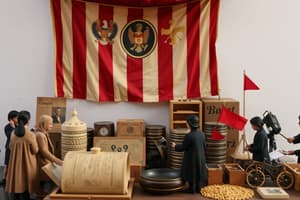Podcast
Questions and Answers
Non-material culture includes physical objects like clothing and tools.
Non-material culture includes physical objects like clothing and tools.
False (B)
Social norms are established expectations of society regarding individual behavior.
Social norms are established expectations of society regarding individual behavior.
True (A)
Material culture refers exclusively to non-physical aspects of culture such as beliefs and values.
Material culture refers exclusively to non-physical aspects of culture such as beliefs and values.
False (B)
Values in a culture represent what is considered worthy, important, or desirable.
Values in a culture represent what is considered worthy, important, or desirable.
Folkways are the ethical standards that differentiate right from wrong in a society.
Folkways are the ethical standards that differentiate right from wrong in a society.
Technology in culture refers to the accumulation of technological tools and knowledge.
Technology in culture refers to the accumulation of technological tools and knowledge.
Culture is defined solely by language and food.
Culture is defined solely by language and food.
Religion is a significant component of culture.
Religion is a significant component of culture.
Medical knowledge is irrelevant to the understanding of culture.
Medical knowledge is irrelevant to the understanding of culture.
Folk art is a traditional element that contributes to cultural heritage.
Folk art is a traditional element that contributes to cultural heritage.
Culture does not provide patterns for meeting social needs.
Culture does not provide patterns for meeting social needs.
Celebrations are not considered a part of culture.
Celebrations are not considered a part of culture.
Clothing choices can vary significantly across different cultures.
Clothing choices can vary significantly across different cultures.
Working schedules are unrelated to cultural practices.
Working schedules are unrelated to cultural practices.
Flashcards are hidden until you start studying
Study Notes
What is Culture?
- Culture is a product of human interaction, shaping social behaviors and customs.
- Represents a complex social heritage, transmitted socially across generations.
- Provides patterns for fulfilling biological and social needs.
- Cultures distinguish between communities and establish norms for behavior.
- Culture is cumulative and meaningful to human societies.
Types of Culture
Non-material Culture
- Encompasses ideas, beliefs, behaviors, gestures, and habits.
- Includes religion, language, and symbols that convey meaning within a community.
Material Culture
- Consists of tangible items produced and used by a society.
- Involves technological tools, food, architectural structures, and fashion accessories.
Elements of Culture
- Knowledge: Any information perceived as true and valuable.
- Belief: Accepted realities forming the basis of community consensus.
- Reality: Existence of both material and non-material components of life.
- Social Norms: Expected behaviors based on societal requirements depending on context.
Cultural Concepts
- Folkways: Patterns of habitual behavior that become conventional in a society.
- Mores: Ethical standards and moral obligations that guide judgments of right and wrong.
- Values: Standards considered worthy or important within a culture.
- Technology: Application of knowledge in producing goods from raw materials.
Cultural Perspectives
- Ethnocentrism: The belief that one’s own culture is superior to others, often leading to bias.
- Cultural Relativism: Understanding and evaluating cultural practices within their own contexts without judgment.
Studying That Suits You
Use AI to generate personalized quizzes and flashcards to suit your learning preferences.




